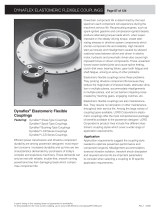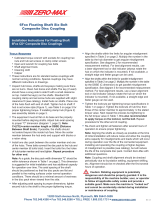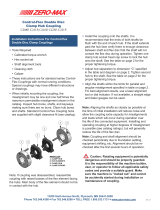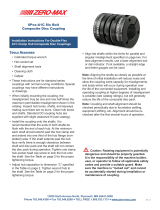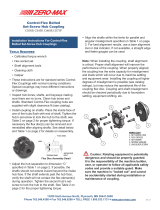
1
INSTALLATION MANUAL
ECHT
ECHTECHT
ECHT-
--
-FLEX COUPLING
FLEX COUPLINGFLEX COUPLING
FLEX COUPLING
®
NES series
Thank you for purchasing an ECHT-FLEX COUPLING. Make sure the unit delivered matches your order and no shortages exist in the parts provided. Any
such shortages or other delivery errors must immediately be reported to your distributor. This manual should be considered an essential part of the
ECHT-FLEX COUPLING and remain with the coupling when redistributed.
To ensure safety, read all instructions thoroughly before installing or working on the equipment.
TSUBAKIMOTO CHAIN CO.
Safety precautions in this manual are classified into two categories: “WARNING” and “CAUTION”. These are
defined as follows:
WARNING Death or serious injury may result from misusing the product without
following the instructions.
CCC CAUTION Minor or moderate injury, as well as damage to the product may result
from misusing the product without following the instructions.
Notice that although categorized under “CAUTION”, subjects discussed may lead to serious results depending on the situation.
WARNING
(General)
・Install a safety cover and prevent access to any rotating parts: otherwise injury may occur. Set a safety
mechanism to stop the rotating parts when the cover is lifted.
・Transporting, installing, operating, maintaining or inspecting must be carried out by skilled and
professional engineers to avoid mis-handling and hazardous situations.
・When coupling is used with vehicles that carry human, use a device to protect the vehicle: otherwise,
accidents and damage may occur.
・When the coupling is used for an elevator, install a safety device on the elevator in order to prevent it from
falling, which can cause damage and accidents resulting in death or injury.
(Unpacking upon delivery)
・If delivered in a wooden case, unpack with care. Sharp nails may cause injury.
(Additional machining)
・Never modify the coupling; the quality or function of the product may decrease and break or damage the
machine or injure the operator.
(Transportation)
・Never step under the product when it is being elevated for transportation: otherwise, either the poduct or
load may fall, causing accidents resulting in death or injury.
(Installation)
・Wear appropriate clothing and safety gear (safety goggles, gloves, shoes, etc.).
・Make sure the power is switched off, and the machine is completely stopped before installing. Take caution
so that the power does not reconnect accidentally.
・Make sure to tighten and apply sufficient amount of anti-loosening agent to the hexagonal socket head cap
screws.
(Operation)
・Avoid contact with any rotating parts ( coupling, shaft, etc. ) during operations. Rotating parts can catch
approaching objects and cause serious injuries.
(Maintenance and inspection)

2
・Avoid contact with any rotating parts ( coupling, shaft, etc. ) during maintenance and inspection. Rotating
parts can catch approaching objects and cause serious injuries.
・Make sure the power is switched off, and the machine is completely stopped before carrying out
maintenance and inspection.
Take caution so that the power does not reconnect accidentally.
Make sure the driving and driven equipment are also completely stopped.
CAUTION
(General)
・Do not use coupling beyond its capacity as specified in the drawing. Exceeding its capacity can break the
machine and cause injuries.
・Do not use damaged couplings. They can break your equipment and cause injuries.
(Transportation)
・Pay extra attention so that the equipment will not fall or rollover during transportations.
(Installation)
・Do not touch the edge and inner diameter of any part with bare hands to avoid possible injury.
・Make sure to align the drive and driven shafts as instructed in the manual when installing the coupling
(Operation)
・Do not touch the coupling during operations to avoid injuries.
・Immediately stop the machine upon any sign of abnormal operation.
(Maintenance and inspection)
・Wear appropriate clothing and safety gear (safety goggles, gloves, shoes, etc.).
・Clean the surrounding area and maintain a clutter-free space to avoid secondary accidents.
・Comply with Ordinance on Labor Safety and Hygiene 2-1-1 general standards.
・Conduct periodic inspections to make sure that the drive and driven shafts are aligned as described in the
manual, and that the rubber and plastic parts are not worn or deformed.
(Environment)
・Coupling scraps should be disposed as general waste by skilled professionals.
・This coupling meets RoHS (Restriction of Certain Hazardous Substances) standards and contains no
hazardous chemicals.

3
1.
Structure
①
Hub
②
Disk(s)
③
Hexagonal Bolts
④
Washer
⑤
Clamp Bolts
⑥
Spacer
2. Condition Requirements
Operate in a well-ventilated room with minimum dust and humidity, at an ambient temperature of –30°C~100°C.
Avoid areas where flammable materials, explosives and corrosive liquid or gas may be present. The units are not
suitable for outdoor use for they are not treated with waterproof or anti-corrosive agents.
Do not disassemble the units because both types are assembled to secure their concentricity prior to shipment.
Recommended tolerance for the shafts is h7
h7h7
h7, except for those mounted toφ35
35 35
35 bores (which are primarily prepared for
servo motor shafts).
..
. Tolerance for these shafts must be within 0~+0.010
0~+0.0100~+0.010
0~+0.010.
3. Installation
3-1.
Use a clean rag to wipe off dust and oil from the shafts and mounting surface of the coupling.
3-2.
Mount coupling onto shafts after they have been aligned carefully.
The more accurate the initial centering of the coupling, the less stress it will experience during
operations. Wear of the shaft bearing, dents in the mounting surface, changes in conditions affected by
temperature and vibration can affect the life of the coupling as well as your equipment. Center
accurately, especially for high-speed operations.
Angular, parallel, and axial misalignments are interrelated. While you increase one, another will
decrease. Center according to the values in Tables 1 or 2 and Graphs 1 or 3.
Table 1. Allowable Misalignment (Spacer Type)
Table 2. Allowable Misalignment (Single Type)
Model No.
Angular
θ(deg)
Parallel
ε(mm)
Axial
γ(mm)
NES07W 1.4° 0.05 ±0.24
NES15W 2° 0.12 ±0.36
NES20W 2°
0.15 ±0.6
NES30W 2°
0.18 ±0.8
NES50W 2°
※1 0.24(0.18)
±0.8
NES70W 2°
0.24 ±0.9
NES100W 2°
0.25 ±1.1
NES250W 2°
0.28 ±1.4
NES800W 2°
0.34 ±1.4
NES1300W 2°
0.52 ±1.8
NES2000W 2° 0.56 ±1.4
NES3000W 2° 0.55 ±1.8
Model No.
Angular
θ(deg)
Parallel
ε(mm)
Axial
γ(mm)
NES07S 0.7° 0.02 ±0.12
NES15S 1° 0.02
±0.18
NES20S 1°
0.02
±0.3
NES30S 1°
0.02
±0.4
NES50S 1°
0.02
±0.4
NES70S 1°
0.02
±0.45
NES100S 1°
0.02
±0.55
NES250S 1°
0.02
±0.7
NES800S 1°
0.02
±0.7
NES1300S 1°
0.02
±0.9
NES2000S 1° 0.02 ±0.7
NES3000S 1° 0.02 ±0.9
Spacer Type
Single type
※1 Parallel
Allowable Misalignment is 0.18mm for Low inertia Hub.

4
Graph 1. Relationship Between Angular and
Axial Misalignments for Spacer Types
Graph 3. Conversion Graph for Angular and
Parallel Misalignments
Allowable misalignments in graphs 1 and 2 are as follows.
・Angular misalignment: Parallel misalignment is 0.02 mm and below, while axial
misalignment is 0 mm.
・Parallel misalignment: Both angular and axial misalignments are 0 mm.
・Axial misalignment: Angular misalignment is 0, while parallel misalignment is 0.02 mm
and below.
To use Graph 1, first convert parallel misalignment to angular value using Graph 3.
Then add the obtained value to the original angular misalignment, and align
according to Graph 1.
Graph 2 includes parallel misalignments below 0.02mm
.
How
HowHow
How
to use the graphs:
to use the graphs:to use the graphs:
to use the graphs:
Example 1
Example 1 Example 1
Example 1
Determine the allowable axial misalignment for NES50W with angular misalignment of 0.4º and parallel
misalignment of 0.1mm.
a) Convert parallel to angular misalignment using Graph 3.
・According to the graph, 0.1mm parallel misalignment is equivalent to 0.85ºangular misalignment.
b) Add the angular value–converted from the parallel misalignment–to the originally given angular
misalignment.
・0.4ºangular misalignment + 0.85º parallel misalignment = 1.25º
c) Determine the allowable axial misalignment using Graph 1.
The graph shows that the allowable axial misalignment is 0.26 mm when angular
misalignment is 1.25º.
Example 2
Example 2 Example 2
Example 2
Determine the allowable parallel misalignment for NES250W with angular misalignment of 0.4º and axial
misalignment of 0.2mm.
a) Determine the angular misalignment using Graph 1.
・According to the graph, allowable angular misalignment is 1.7º when axial misalignment is 0.2mm.
b) Next, determine the allowable parallel misalignment using Graph 3.
・Angular misalignment of 0.4º leaves a remainder of (1.7-0.4)= 1.3º allowable angle.
・Finally, convert this value to parallel misalignment using Graph 3 and obtain the final value,
0.18mm.
Example 3
Example 3 Example 3
Example 3
Determine the allowable axial misalignment for NES50S with angular misalignment of 0.4ºand parallel misalignment of 0.01mm.
a) Determine the allowable axial misalignment by using Graph 3.
・According to the graph, axial misalignment is 0.23mm while angular misalignment is 0.4º.
(The parallel misalignment, 0.01mm does not need to be considered in this case because the graph already takes its effects into account.)
3-3.
Verify that the coupling rotates and moves in the axial direction when applied with light force–while
clamp bolts are loosely screwed on. Alignment is complete if the coupling rotates and moves smoothly.
Do not apply heavy load in the axial direction while fixing your coupling to the shafts. This may deform
or displace the disk(s) and lead to unit failure.
Graph 2. Relationship Between Angular and
Axial Misalignments for Single Types
Figure 4. Centering

5
3-4.
Be sure the coupling is smoothly fixed to both shafts. Then, tighten the clamp bolts with the torque
specified in Table 4. Finally, insert the shafts all the way into the end of hubs.
Table 4. Clamp Bolt Tightening Torque
Model No. NES07
NES15
NES20 NES30
NES50
NES70
NES100
NES250
NES800
NES1300
NES2000
NES3000
Bolt Size M2
M2
M2.5 M2.5
M3 M3 M4 M4 M6 M6 M8 M8
Bolt Tightening Torque N・m
0.5
0.5
1.0 1.0 1.9 1.9 3.8 3.8 12 12 30 30
4.
Torque Capacity
Table 5. Torque Capacity
Model No. NES07 NES15 NES20 NES30 NES50 NES70 NES100 NES250 NES800 NES1300 NES2000 NES3000
Allowable Torque (N・m)
0.7 1.5 2.0 3.0 5.0 7.0 10 25 80 130 200 300
Max. Speed (r/min) 18000
18000
18000
18000
18000
18000
15000 10000 10000 10000 9000 8000
However, note that the clamp portions of hubs, whose bore diameters are listed in Table 6, cannot
transfer torque above the specified allowable torque capacities.
Table 6. Transmissible torque at clamp portion
(N・m)
Shaft Dia
Model No
NES15 1.3 ― ― ― ― ― ― ― ― ― ― ―
NES1300
(Straight Hub) ― ― 107 118 ― ― ― ― ― ― ― ―
NES1300
(Low inertia
Hub)
― 105 105 110 115 120 125 ― ― ― ― ―
NES3000
(Low inertia
Hub)
― ― ― ― ― ― ― 235 245 255 260 265
4 19 20 22 24 25 28 32 35 38 40 42

6
5. Warranty:
TSUBAKIMOTO CHAIN Co.: hereinafter referred to as “Seller”
Customer: hereinafter referred to as “Buyer”
Goods sold or supplied by Seller to Buyer: hereinafter referred to as “Goods”
1. Warranty period without charge
18 months effective the date of shipment or 12 months effective the first use of Goods, including installation of
Goods to Buyer’s equipment or machines–whichever comes first.
2. Warranty coverage
Should any damage or problem with the Goods arise within the warranty period, given that the Goods were
operated and maintained according to the instructions provided in the manual, Seller will repair and replace
at no charge once the Goods are returned to the Seller. This warranty does not cover the following:
1) Any cost related to removal or re-installation of Goods from the Buyer’s equipment or machines to repair or
replace parts.
2) Cost to transport Buyer’s equipment or machines to the Buyer’s repair shop.
3) Costs to reimburse any profit loss due to any repair or damage and consequential losses caused by the
Buyer.
3. Warranty with charge
Seller will charge any investigation and repair of Goods caused by:
1) Improper installation by failing to follow the instruction manual.
2) Insufficient maintenance or improper operation by the Buyer.
3) Incorrect installation of Goods into other equipment or machines.
4) Structure change of the Goods by any modifications or alterations by the Buyer.
5) Any repair by engineers other than the Seller or those designated by the Seller.
6) Operation in an inappropriate environment not specified in the manual.
7) Force Majeure or forces beyond the Seller’s control such as natural disasters and injustices done by a third
party.
8) Secondary damage or problem incurred by the Buyer’s equipment or machines.
9) Defected parts supplied, or specified by the Buyer.
10) Incorrect wiring or parameter setting by the Buyer.
11) The end of life cycle of the Goods under normal use condition.
12) Losses or damages not liable to the Seller.
4. Dispatch Service
Service to dispatch a Seller’s engineer to investigate, adjust, or trial test the Seller’s Goods is
at the Buyer’s expense.
Global Associated Partners:
U.S. Tsubaki Power Transmission, LLC
Tsubakimoto Singapore Pte. Ltd.
Tsubakimoto Europe B.V.
http://www.ustsubaki.com/
http://www.ustsubaki.com/http://www.ustsubaki.com/
http://www.ustsubaki.com/
http://tsubaki.sg/
http://tsubaki.sg/http://tsubaki.sg/
http://tsubaki.sg/
http://tsubaki.eu/
http://tsubaki.eu/http://tsubaki.eu/
http://tsubaki.eu/
Tsubaki of Canada Limited
Taiwan Tsubakimoto Co.
Tsubakimoto U.K. Ltd.
http://tsubaki.ca/
http://tsubaki.ca/http://tsubaki.ca/
http://tsubaki.ca/
http://tsubakimoto.com.tw/
http://tsubakimoto.com.tw/http://tsubakimoto.com.tw/
http://tsubakimoto.com.tw/
http://tsubaki.eu/
http://tsubaki.eu/http://tsubaki.eu/
http://tsubaki.eu/
Tsubaki Australia Pty. Limited
Tsubakimoto Chain (Shanghai) Co., Ltd. Tsubakimoto Korea Co., Ltd..
http://tsubaki.com.au/
http://tsubaki.com.au/http://tsubaki.com.au/
http://tsubaki.com.au/
http://tsubaki.cn/
http://tsubaki.cn/http://tsubaki.cn/
http://tsubaki.cn/
http://tsubakimoto
http://tsubakimotohttp://tsubakimoto
http://tsubakimoto-
--
-tck.co.kr/
tck.co.kr/tck.co.kr/
tck.co.kr/
DATE 2017/10/01 Bulletin No. 11K00TS000000E2
TSUBAKIMOTO CHAIN CO.
1-1, Kohtari-Kuresumi, Nagaokakyo
Kyoto 617- 0833, Japan
Website: http://tsubakimoto.com/
/










